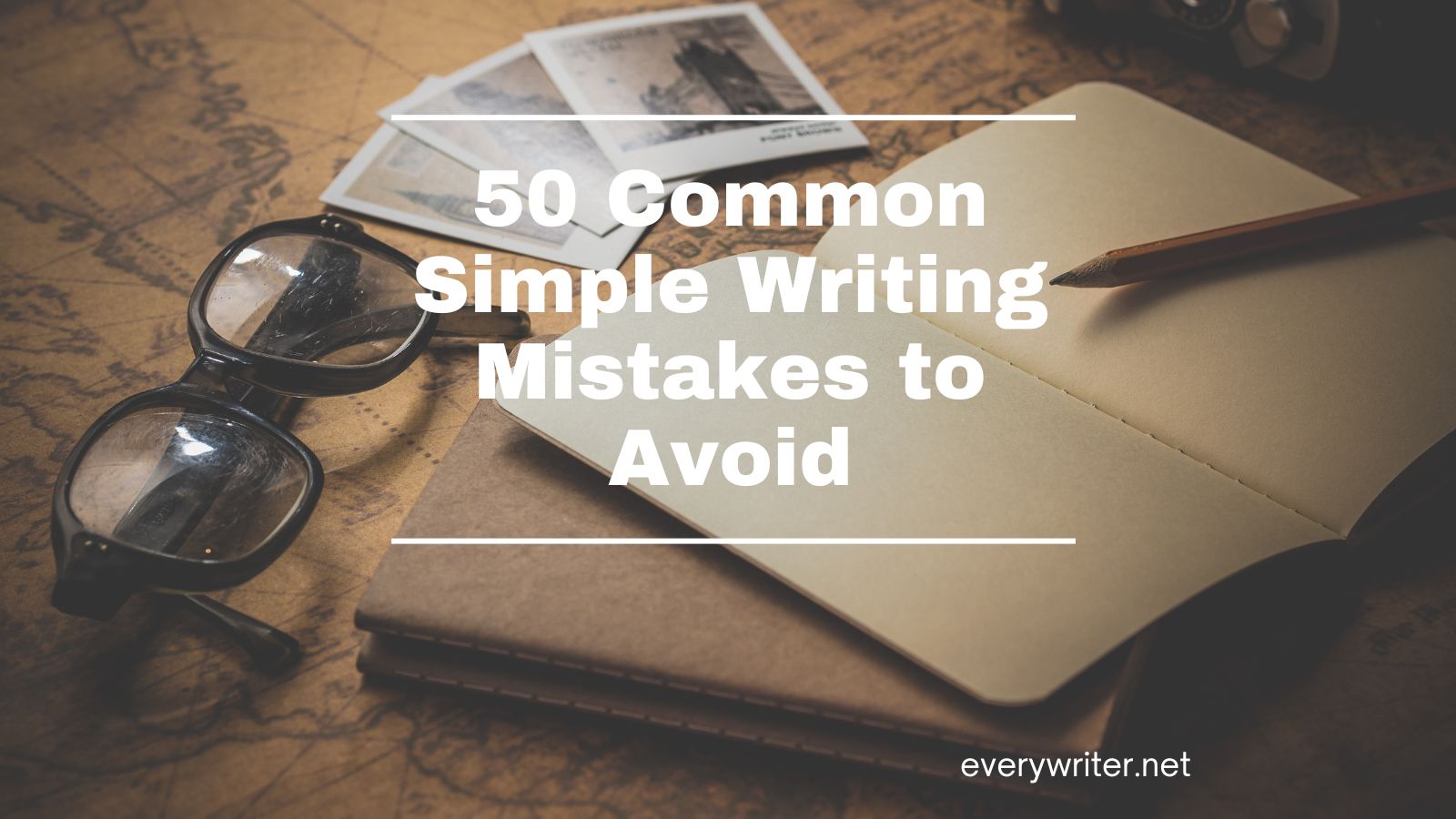
Here are 50 common simple writing mistakes to avoid. It helps a great deal if you just know these. Sure Grammarly and other grammar checkers will catch some of these mistakes, but more times than not you’ll find these very simple mistakes can throw off those checkers. It’s much easier to just memorize these and move on. You can use this list as a reference. It’s quick and easy. Everyone makes mistakes and these simple mistakes are very common. Take a look at the list and see if there are any you didn’t know.
- Its vs. It’s – Its denotes possession. It’s is a contraction of “it is.”
- Your vs. You’re – Your indicates possession. You’re is a contraction of “you are.”
- They’re vs. Their vs. There – They’re is a contraction of “they are.” Their indicates possession. There refers to a location.
- Too vs. To vs. Two – Too means “also” or “excessively.” To is a preposition. Two is the number.
- Loose vs. Lose – Loose means not tight. Lose is the opposite of win or gain.
- Than vs. Then – Than relates things being compared. Then indicates time.
- Passed vs. Past – Passed refers to the verb (e.g. he passed the test). Past denotes time (e.g. in the past).
- Led vs. Lead – Led is the past tense of the verb lead. Lead is the present tense.
- Peak vs. Peek vs. Pique – Peak refers to the top or maximum. Peek means a quick look. Pique means to stimulate interest.
- Bare vs. Bear – Bare means naked. Bear refers to the animal.
- Adapt vs. Adept – Adapt means adjust. Adept describes someone skilled.
- Affect vs. Effect – Affect is a verb meaning influence. Effect is usually a noun meaning result.
- Sieze vs. Cease – Sieze means take by force. Cease means stop.
- Definite vs. Definitely – Definite describes something unambiguous. Definitely means without doubt.
- Precede vs. Proceed – Precede means go before. Proceed means go forward.
- Principle vs. Principal – Principle is a rule. Principal refers to the head of a school.
- Lesser vs. Less – Use lesser when comparing two things. Use less when discussing a general amount.
- Farther vs. Further – Farther refers to physical distance. Further implies degree.
- Allusion vs. Illusion – An allusion references something. An illusion is not real.
- Ensure vs. Insure – Ensure means guarantee. Insure refers to insurance.
- Amount vs. Number – Use amount with uncountable nouns. Use number with countable quantities.
- Of vs. Have – “Could of” and “should of” are incorrect. Use “could have” or “should have.”
- Are vs. Our – Are is a verb. Our indicates possession.
- Advice vs. Advise – Advice is a noun (e.g. offer advice). Advise is a verb (e.g. advise them).
- Disinterested vs. Uninterested – Disinterested means impartial. Uninterested means not interested.
- Chronic vs. Acute – Chronic describes ongoing illness. Acute refers to sudden onset.
- Compared to vs. Compared with – Use “to” when contrasting two subjects. Use “with” when mentioning shared traits.
- Fewer vs. Less – Use fewer with countable things. Use less with singular mass nouns.
- Irony vs. Coincidence – Irony is an unexpected result. Coincidence is a random occurrence.
- Emigrate vs. Immigrate – Emigrate means to leave a place. Immigrate means to enter/settle in a new place.
- Imply vs. Infer – To imply is to suggest something. To infer is to deduce or conclude.
- Compliment vs. Complement – A compliment praises someone. A complement completes something.
- Cue vs. Queue – A cue is a signal. A queue is a waiting line.
- Adverse vs. Averse – Adverse means antagonistic. Averse means having a dislike.
- Elicit vs. Illicit – Elicit means draw out. Illicit means illegal.
- Discreet vs. Discrete – Discreet means private or cautious. Discrete means separate or distinct.
- Medal vs. Meddle vs. Mettle – A medal is an award. To meddle is to interfere. Mettle refers to fortitude.
- Rack vs. Wrack – Rack refers to a framework or intense pain. Wrack means wreckage or ruin.
- Rein vs. Reign – Rein controls a horse. Reign refers to ruling.
- Waiver vs. Waver – A waiver relinquishes something. To waver is to be unsteady.
- Uninterested vs. Disinterested – Uninterested means lacking interest. Disinterested means impartial.
- Pernickety vs. Persnickety – Pernickety means fussy. Persnickety is a variant of the same.
- Defuse vs. Diffuse – To defuse is to neutralize. To diffuse is to spread over a wide area.
- Faze vs. Phase – To faze is to disturb or disconcert. A phase is a stage or period.
- Flout vs. Flaunt – To flout is to openly disregard rules. To flaunt is to show off.
- Unphased vs. Unfazed – Unphased is incorrect. Unfazed means remaining calm.
- Baited breath vs. Bated breath – Bated breath demonstrates anxiety or suspense.
- Piece vs. Peace – Piece refers to a portion. Peace means tranquility.
- Tortuous vs. Torturous – Tortuous means winding and twisting. Torturous means inflicting pain.
- Hoard vs. Horde – To hoard is to stockpile. A horde is a large crowd.
Be vigilant for these common errors, among many others, to strengthen your writing skills. Consistently proofread your work to reinforce proper usage over time. If you want to add to our list, please leave your own common mistakes in the comments below.
- How to Build Unstoppable Story Tension: 5 Proven Techniques (+ Free Worksheet) - July 3, 2025
- The Kindness and Quiet Desire of Strawberries - July 2, 2025
- Science Fiction Quiz #1 - May 21, 2025
Oh I didn’t know that I had made so many of these basic mistakes before
Emigrate means to leave a place. Immigrate means to enter/settle in a new place. Thanks for the help!